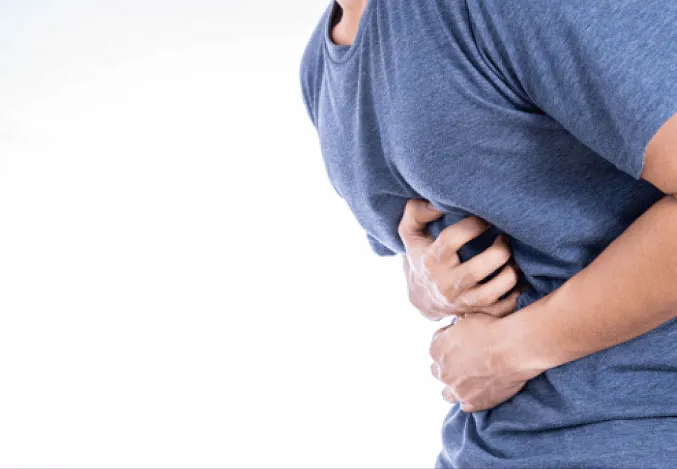Information
Simply browse through the range of treatment options in this category and add your preferred option to the shopping cart. After completing your selection you will be directed to our simple to follow checkout process.
What is Irritable bowel syndrome?
Irritable bowel syndrome (IBS) is a functional gastrointestinal disorder characterised by a group of symptoms, including abdominal pain and inconsistency of bowel movements. It is a common disorder that primarily affects the large intestine and the digestive system of a person's body. It is a mix of stomach discomfort or pain and very disorganised and troubling bowel habits, either going more or less than often. A person experiencing irritable bowel syndrome may have a different kind of stool. Irritable bowel syndrome is a chronic disorder that a person may have to manage in the long term. Irritable bowel syndrome is also called:
• IBS colitis
• Mucous colitis
• Spastic colon
• Nervous colon
• Spastic bowel
The four types of irritable bowel syndrome include:
• IBS with constipation (IBS-C)
• IBS with diarrhoea (IBS-D)
• Mixed IBS (IBS-M) alternates between constipation and diarrhoea
• Unsubtyped IBS (IBS-U) for patients who don't fit into the above types
It can be a long-lasting problem that changes how a person lives their life. Disorders like anxiety, depression and fatigue are common with people who have irritable bowel syndrome.
What causes irritable bowel syndrome?
The causes of irritable bowel syndrome are not clear and still unknown, but studies have suggested that factors that appear to play a role in this disorder include:
-
Muscle contractions in the intestine: The intestines walls are lined with layers of muscles that contract as food is moved through a person's digestive tract. Contractions that are intense and last longer than usual can cause gas in your digestive area. Weak and short intestinal contractions can cause hard, dry stools.
-
Severe infection: IBS may develop after a severe bout of diarrhoea (gastroenteritis) which tends to be caused by bacteria or a virus. IBS can also be linked with a surplus of bacteria in the intestines (bacterial overgrowth).
-
Nervous system: Abnormalities in your digestive system's nerves may cause you to experience severe discomfort when your abdomen stretches due to gas or stool. Poorly coordinated and insufficient signals between the brain and the intestines can be the cause for the body to overreact to changes that occur in the digestive process, leading to pain, diarrhoea and constipation.
-
Early life stress: People exposed to stressful events, more usually in childhood, tend to experience irritable bowel syndrome.
-
Changes in gut microbes: Changes in bacteria, fungi and viruses that are typically in the intestines play a crucial role.
-
Mild celiac disease: damages the intestines, causing IBS symptoms.
More causes include slowed or spastic movements of the colon, causing painful cramping, gut motility, pain sensitivity, infections including small intestinal bacterial growth overgrowth, genetic factors and food sensitivity. Vitamin D deficiency is also common in people who experience irritable bowel syndrome. Genetics play an important role in IBS as people with a family history of this disease are more likely to be affected by it in their life. IBS happens in women more often than men, so researchers believe that hormones may also play a role in this disorder. Some foods also trigger irritable bowel syndrome, such as spicy, fatty, fried foods, carbonated drinks, large meals and too much fibre.
What are the common symptoms of irritable bowel syndrome?
Irritable bowel syndrome is considered to affect around 1 in 5 people in the UK. Most of them are women. People are most likely to get this disorder in their late teens to early 40s. The most common and long term symptoms of irritable bowel syndrome include:
• Abdominal pain, cramping or bloating linked to passing a bowel movement
• Changes in the appearance of bowel movement
• Changes in how regularly you have a bowel movement
• frequent diarrhoea and constipation
• Chronic fatigue
Severe symptoms that may lead to life-threatening conditions in the long term include:
• Weight loss
• Rectal bleeding
• Iron deficiency anaemia
• Vomiting
• Consistent abdominal pain that isn't relieved by medications or a bowel movement
Symptoms in women are more visible during their time of menstruation. Menopausal women tend to experience fewer symptoms than women who are still menstruating. Women also experience IBS symptoms during pregnancy.
Symptoms in men are mostly the same as in women; however, fewer men tend to report or seek help when they experience symptoms of irritable bowel syndrome.
IBS does not lead to more severe problems, and it does not cause cancer or inflammatory bowel diseases such as ulcerative colitis. If nothing is done, symptoms may continue or come and go.
How to treat irritable bowel syndrome?
There is no definitive cure for irritable bowel syndrome. Treatment is more specifically aimed at symptom relief which is mostly done by lifestyle changes as well as home remedies that are first suggested by doctors and then the use of medications if the previous precautions were in vain.
Home remedies and lifestyle changes include :
-
Regular physical exercise
-
Avoiding deep-fried and spicy foods
-
Minimising stress
-
Eating smaller meals at regular intervals
-
Avoiding caffeinated beverages and alcohol
-
Taking probiotics
-
Stop smoking
-
Drinking water
The doctor may perform the following test to confirm their diagnosis further and treat your disorder accordingly:
• Colonoscopy to look for signs of any blockage or inflammation in your intestines
• Endoscopy to check for heartburn and indigestion
• Stool tests for infections
If you are still experiencing severe symptoms even after home remedies and lifestyle changes, your doctor may prescribe you medications to treat irritable bowel syndrome. In this situation, it is of at most importance to tell your doctor about the herbal remedies and over the counter medications you previously used or are still using as your doctor will prescribe you new medicines accordingly. These medications may include:
• Bulking agents such as psyllium
• Antibiotics such as rifaximin to help treat any bacterial overgrowth in your intestines
• Probiotics to help with digestive problems
• Antispasmodics to control colon muscle spasms
• Linaclotide relieves constipation
• Lubiprostone helps in IBS in women
• Plecanatide increases gastrointestinal fluid
• Antidepressants help relieve symptoms
• Tenapanor increase bowel movement
• Alosetron can help ease stomach pain and slow your bowel to relieve diarrhoea
• Eluxadoline is used to reduce bowel contractions, belly cramps and diarrhoea.
These medications have severe side effects, so it is advised to use them carefully and with a doctor's prescription.
These medications may help reduce the symptoms of irritable bowel syndrome who is experiencing severe abdominal pain, constipation and infection in the intestines. Still, it is significant to use these medications with a doctor's prescription because they are specific to every person and may not work for a person experiencing different symptoms. Laxatives and other drugs can be habit-forming if they are not used carefully.
Can I buy irritable bowel syndrome treatment online?
Yes! You can quickly and discreetly buy irritable bowel syndrome treatment online through our website.
How long does it take to treat IBS?
Relief of IBS symptoms is a slow process. It may take up to six months or more for a more definitive improvement in symptoms. With proper diet and medications, symptoms of IBS can be significantly improved. Patience is required to treat irritable bowel syndrome because this is a long-lasting disorder with irregular symptoms.
Patient information leaflet:
Always read your patient information leaflet before starting your treatment.
How to relieve IBS pain?
In order to effectively manage the pain that is commonly associated with IBS, you can use various forms of treatments, such as antispasmodics and peppermint oils. Such treatments are ideal for reducing abdominal pain that often occurs in patients after eating.
Additionally, some studies suggest that probiotic supplements can help manage IBS pain. These live microorganisms may be beneficial for gut health and may be able to reduce bloating. Finally, use antispasmodic medications, such as Mebeverine and Alverine.
How long do IBS attacks last?
IBS attacks can occur and subside on their own without a given timeframe. They can long for however long, at whatever intensity. Note that the length of IBS attacks can vary significantly from person to person. You may find that your symptoms come and go irregularly, indicating that you can not estimate the approximate length of an attack.
Can exercise help IBS?
This may vary from person to person. This is because some experts suggest that the holistic nature of exercise could help relieve symptoms of IBS. They suggest that since problems in brain-gut communication lead to the occurrence of IBS, the effects of exercise on the brain and body could improve the condition.
How can I calm an IBS flare-up?
When you are dealing with an IBS flare-up, you should use one of the most common treatments for symptom relief a flare up. For instance, you should use peppermint oil capsules or mebeverine.
Note that the treatment depends on the symptoms that you may experience
What can I do to prevent IBS?
Although Irritable Bowel Syndrome has no cure, you can easily manage the condition with the help of a simple diet and lifestyle changes, along with a better comprehension of the condition. But, of course, you should be mindful of your IBS triggers, too.
The amount of fibre in an IBS sufferer's diet is essential. Fibre is divided into two groups; soluble fibre, which is the fibre that the body can digest, and insoluble fibre, which the body can not digest.
So, if you experience diarrhoea as a common symptom of IBS, you should decrease the amount of insoluble fibre you consume. On the other hand, if you experience constipation, you should increase the amount of soluble fibre in your diet.
Soluble Fibre
- Oats
- Barley
- Rye
- Root vegetables, like carrots and potatoes
- Fruit, like bananas and apples
- Golden linseeds
Insoluble Fibre
- Whole grain bread or whole wheat bread
- Bran
- Nuts and seeds
- Cereals
In addition to this, here are more things that you can do for an IBS-friendly diet:
- Eat regular meals
- Avoid caffeinated drinks
- Avoid alcohol
- Avoid fizzy or soft drinks
- Drink plenty of fluids, especially water
- Reduce the intake of resistant starch (processed foods)
- If you suffer from diarrhoea, avoid sorbitol (an artificial sweetener typically in chewing gum and sugar-free sweets)
- If you suffer from flatulence and bloating, eat oats
- Take probiotics
Furthermore, it would be best if you reduced the stress levels as that can help reduce the severity and frequency of IBS flare-ups. Some good stress-relieving techniques may include:
- meditation and breathing exercises
- regular exercise (walking, running, swimming)
- physical activities ( Yoga or Pilates)
However, you can seek stress counselling if your stress levels can not be managed. This can include the following:
- Psychotherapy: involves discussing the causes of your stress with a therapist
- Cognitive Behavioural Therapy (CBT): examines how a person's beliefs impact their behaviour. This type of therapy is typically used to alter someone's thinking patterns in order to help change how they perceive and cope with the sources of their stress.
- Hypnotherapy: uses hypnosis to change the unconscious mind’s perspectives towards the condition
Related IBS Treatment advice & articles
How to order
Order your IBS Treatment medication in a few clicks. Ordering from us is easy, fast and discreet.
Free Online Assessment
Answer a few simple questions about your health.
Choose Your Medication
Our prescribers will review and guide you to the right treatment.
Fast Delivery
Once approved, your treatment is dispatched discreet packaging by next day delivery.

